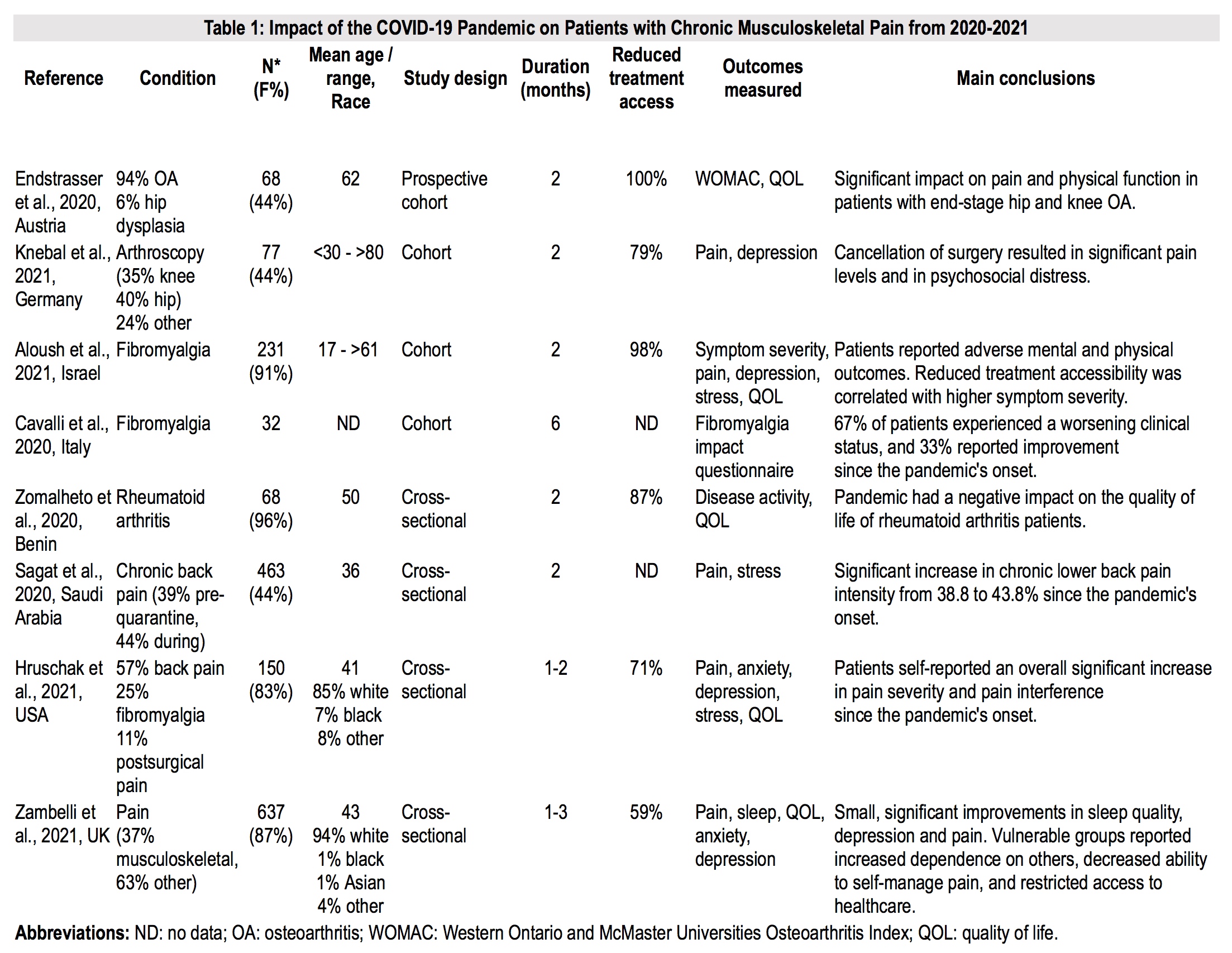Session Information
Date: Tuesday, November 9, 2021
Title: Patient Outcomes, Preferences, & Attitudes Poster IV: COVID-19 (1589–1613)
Session Type: Poster Session D
Session Time: 8:30AM-10:30AM
Background/Purpose: The management of the patients with chronic conditions such as musculoskeletal pain can be affected by the COVID-19 pandemic. However, the impact of COVID-19 pandemic in the management of pain has not been clearly delineated. We conducted a descriptive review of the impact of the COVID-19 pandemic on chronic musculoskeletal pain management and healthcare system accessibility during 2020-2021 to better inform clinical decision-making.
Methods: We searched MEDLINE and the Cochrane Database from December 2019 to May 2021. We included studies of any design investigating the impact of COVID-19 pandemic on the management of patients with chronic musculoskeletal pain. Screening and data extraction were undertaken by two reviewers. We summarized the disease conditions, demographic information, study design types, duration of observation, treatment accessibility, outcomes measured, and main conclusions.
Results: We identified 114 abstracts and examined 8 published studies from 8 different countries during 2020-2021 on the impact of the COVID-19 pandemic on adults with chronic musculoskeletal pain conditions. Table 1 summarizes the evidence reviewed according to types of conditions, including osteoarthritis, fibromyalgia, rheumatoid arthritis, chronic lower back pain and miscellaneous chronic musculoskeletal pain. There are 4 cohort and 4 cross-sectional studies with 1,724 participants. The mean age ranged from 36-62 years and data was collected for 1 to 6 months. 59-100% of patients in studies reported reduced treatment accessibility. Of 8 studies, 2 prospective cohort studies on osteoarthritis reported significant increases in pain and loss of function, with an average Visual Analog Score (VAS) increase of 0.7 pre- to post-quarantine. Similarly, higher pain intensity was reported among fibromyalgia and chronic lower back pain patients. Additionally, back pain point prevalence increased from 38.8 to 43.8% within the same sample. In a cross-sectional study, 68 rheumatoid arthritis patients reported increased VAS pain scores and lower quality of life since the onset of the pandemic. 2 other cross-sectional studies with 787 miscellaneous chronic pain patients reported conflicting results; while one study found an 8% average pain severity increase and a 6% average pain interference increase, the other one reported decreases in both average pain severity and pain interference as measured by the Brief Pain Inventory scale. Vulnerable patients reported high dependence on others, low ability to self-manage pain, and restricted access to healthcare. Notably, the study with the highest treatment accessibility reported some improvements in pain, depression and sleep quality.
Conclusion: Overall, the COVID-19 pandemic has adversely affected pain severity, physical function and quality of life in patients with chronic musculoskeletal pain. Despite the small number of studies available, our review suggests the pandemic had negative impacts on these patients and lowered treatment accessibility. Further consideration on patient wellbeing and healthcare accessibility for chronic pain management during the pandemic is recommended.
 Table 1 summarizes the impacts of the COVID_19 pandemic on patients with chronic musculoskeletal pain.
Table 1 summarizes the impacts of the COVID_19 pandemic on patients with chronic musculoskeletal pain.
To cite this abstract in AMA style:
Oomen-Lochtefeld S, Tsemekhin R, Price L, Guang C, Wang C. Has the COVID 19 Pandemic Impacted the Management of Chronic Musculoskeletal Pain? [abstract]. Arthritis Rheumatol. 2021; 73 (suppl 9). https://acrabstracts.org/abstract/has-the-covid-19-pandemic-impacted-the-management-of-chronic-musculoskeletal-pain/. Accessed .« Back to ACR Convergence 2021
ACR Meeting Abstracts - https://acrabstracts.org/abstract/has-the-covid-19-pandemic-impacted-the-management-of-chronic-musculoskeletal-pain/
